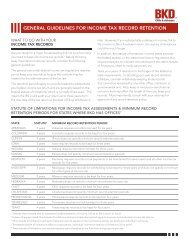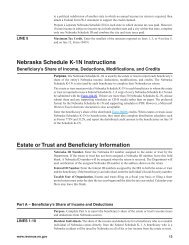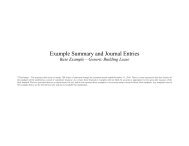acfe fraud prevention check-up - BKD
acfe fraud prevention check-up - BKD
acfe fraud prevention check-up - BKD
- No tags were found...
Create successful ePaper yourself
Turn your PDF publications into a flip-book with our unique Google optimized e-Paper software.
- Invoices for goods not received or services not performed.- Theft of inventory or use of business assets for personal gain.- False or inflated expense claims.- Theft or use of customer lists and proprietary information.• Employees in collusion with vendors, customers, or third parties.- Payment of inflated or fictitious invoices.- Issuance of inflated or fictitious credit notes.- Invoices for goods not received or services not performed.- Preferred pricing or delivery.- Contract bid rigging.- Theft or use of customer lists and proprietary information.• Vendors.- Inflated or fictitious invoices.- Short shipments or substitution of lower quality goods.- Invoices for goods not received or services not preformed.• Customers.- False claims for damaged or returned goods or short shipments.Protecting against these risks requires not only physical safeguarding controls, but also periodic detective controlssuch as physical counts of inventory with reconciliations to the general ledger. Remember, a smart perpetrator maybe thinking about such controls and design the <strong>fraud</strong> to circumvent or be concealed from those controls. Thoseconducting the risk assessment should keep this in mind when deliberating misappropriation of asset schemes andtheir impact to the organization.Corr<strong>up</strong>tionCorr<strong>up</strong>tion is operationally defined as the misuse of entrusted power for private gain. In the United States, theFCPA prohibits U.S. entities, their foreign subsidiaries, and others from bribing foreign government officials,either directly or indirectly, to obtain or retain business. There are similar anti-corr<strong>up</strong>tion laws in other countriesas well as guidelines established by the United Nations Convention Against Corr<strong>up</strong>tion, to which more than 100countries are signatories.Organizations that have operations outside their home countries need to consider other relevant anti-corr<strong>up</strong>tionlaws when establishing a <strong>fraud</strong> risk management program. Transparency International, a multinational organizationfocused on anti-corr<strong>up</strong>tion and transparency in business and government, issues an annual Corr<strong>up</strong>tion PerceptionIndex, which ranks countries on their perceived levels of corr<strong>up</strong>tion. The Corr<strong>up</strong>tion Perception Index canassist organizations in prioritizing their anti-corr<strong>up</strong>tion efforts in areas of the world at greatest risk. It must beremembered, of course, that corr<strong>up</strong>tion can also occur in an organization’s home country.A common form of corr<strong>up</strong>tion is aiding and abetting. Law enforcement authorities worldwide have prosecutednumerous cases where organizations were not misstating their financial statements, but were knowingly structuringtransactions or making representations that enabled other organizations to <strong>fraud</strong>ulently misstate their financialstatements. A thorough risk assessment will consider the risk that someone may be engaging in such behavior aswell as other types of corr<strong>up</strong>tion that may be applicable to the organization.26









